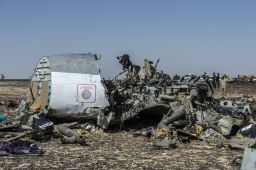Story highlights
Confidential government document pointed to fear of airport radicals in 2004
Russian passenger plane may have been brought down by airport worker in Eygpt
Document says several workers appeared radicalized after trips to Saudi Arabia, Pakistan, India and Mali.
French intelligence services were concerned as early as 2004 about the radicalization of many airport workers at Paris’ Charles de Gaulle Airport, according to a confidential document from the French Interior Ministry.
This document, seen by CNN, targets three shipping companies operating at the airport, which is in Roissy, about 20 kilometers (13 miles) northeast of central Paris.
The radicalization of airport workers has caused new concern following the crash in October of a Russian passenger plane in Egypt’s Sinai region. Some Western intelligence officials believe the Russian jet was brought down by a bomb smuggled on board by an airport worker in the Egyptian resort of Sharm el-Sheikh.
Just this week, a French counterterrorism source told CNN that the monitoring of Islamic radicalization among public transit workers and airport workers has been going on for “a couple of years” and included the “national railway service SNCF, Paris public transport company RATP and airports such as Roissy Charles de Gaulle and Orly.”
On Thursday, the same source told CNN that “more than a hundred public transit workers from the company RATP have left for Syria since 2012.”
‘Illegal prayer sites’ at airports
But the document, which is from June 2004, shows that the monitoring had been going on far longer than that.
In 2004, the Paris Airport Authority – the authority in charge of all Paris airports – provided two prayer rooms for Muslims. But they were not being used by Islamic radicals, the document says.
Instead, the document says, there were “illegal prayer sites at the airport used by several Muslim airport workers” who at the time “belonged to mosques preaching radical Islam” in their neighborhoods on the Paris outskirts, including Argenteuil, Sevran and Bobigny.

The radical airport workers, the document says, were “easily swayed young people who are mostly Muslim,” coming from “the same neighborhood, the same cities.”
The document says that sometimes several members of the same family, who appeared to be radicalized, worked at the airport together. These families, the document said, seemed to be “the leaders of this movement.”
According to the document, some of these people “openly showed anti-American views and showed their support and enthusiasm regarding the 9/11 attacks.”
Some people working for airport cargo companies had “access to airside” – the other side of the security cordon from the street – and were “known by intelligence services as radicalized individuals and who are under a fiche S” and who traveled to “sensitive areas of the world in order to learn more about Islam.”
Fiche S is an intelligence file used by law enforcement to flag and monitor someone who could be a national security threat.
Visits to an Osama bin Laden training camp
The document lists the names of several airport workers who appeared to have been radicalized after trips to Saudi Arabia, Pakistan, India and Mali.
Some of the airport workers also appeared to be close friends with “people traveling to paramilitary training camps,” according to the document.
It mentions trips to the university of Dimaj in the city of Sa’dah, Yemen, in 1997 and 1998, where there was a paramilitary training camp financed by Osama bin Laden.
The document says the threat could be more significant because “some individuals are temporary workers” and some of them “are still unknown to the intelligence services.”
The document says these three companies worked with “10 temporary employment agencies and it is particularly difficult to monitor every single temporary airport worker.”
The authorities who wrote the document note that this “phenomenon of radicalization is amplified by the fact that some union workers are helping some individuals to work together based on affinity, neighborhood of origin, or religion which facilitates proselytism.”

